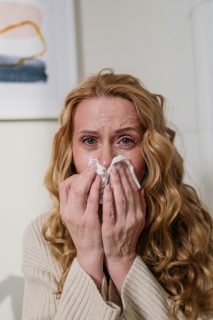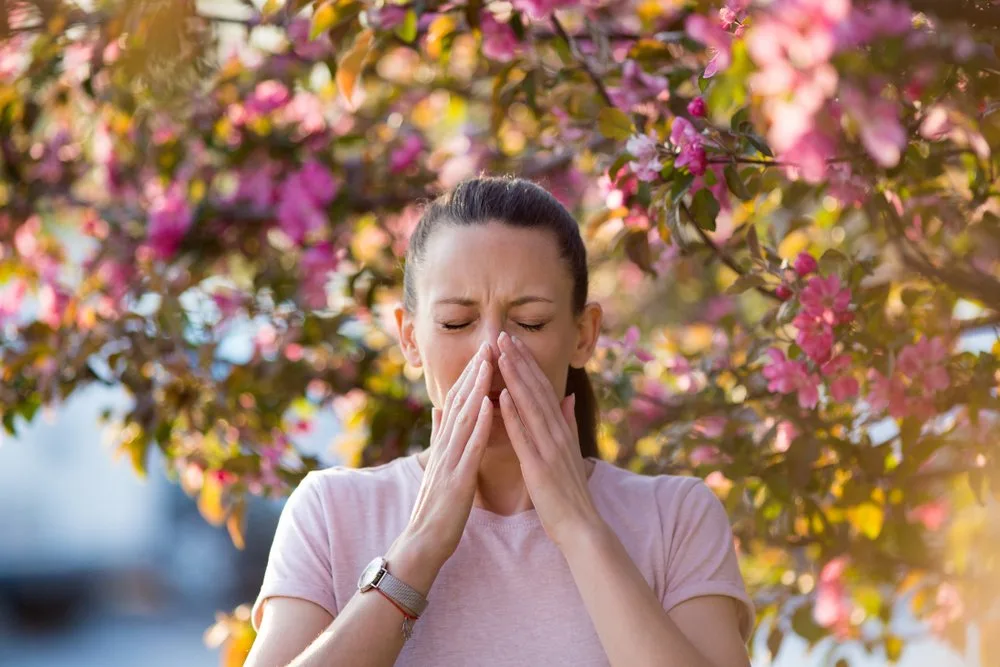The good news? Spring is finally here! Unfortunately, the bad news is that it has a tendency to bring with it seasonal allergies. The blossoms are beautiful but all unfortunately seemingly to blame for the runny, stuffy nose and itchy eyes feeling. Yep…Spring is definitely allergy season, but what are allergies, how can we combat them, and is 2021 going to be the worst year for us allergy sufferers yet?
What are seasonal allergies?

Photo by cottonbro from Pexels
Allergies that occur within a particular season or during the changeover from one season to another are also known as allergic rhinitis or, more commonly, and perhaps aptly, hay fever. According to the American Academy of Allergy, Asthma & Immunology, about 8% of Americans experience it on a yearly basis. Worldwide, it affects anywhere between 10% and 30% of the population. But why on earth do we all start sneezing as soon as Spring comes around? Well, the main culprit here is pollen. Hay fever occurs when the immune system overreacts to an outdoor allergen – usually pollen. This triggers an allergic response in the body.
According to Healthline, the most common allergens are wind-pollinated plants such as trees, grasses, and weeds. Insect pollinated plants are generally not to blame as the pollen is heavy and thus, doesn’t remain airborne for long. The aptly named hay fever gets its name from the hay cutting season which was usually in the warmer months when most people experienced symptoms. Though seasonal allergies are most common during the summer months, it is also possible to experience allergic rhinitis year-round which…doesn’t sound fun.
What are some of the symptoms associated with seasonal allergies?
Symptoms can be mild or severe and can differ from person to person. That being said, the most common symptoms are:
- Sneezing
- Runny nose
- Stuffy nose
- Watery eyes
- Itchy eyes
- Itching in the sinuses, throat, or ear canals
- Ear congestion
- Postnasal drip
Other less common symptoms include:
- Headache
- Shortness of breath
- Wheezing
- Coughing
Are allergies worse in 2021?
If you get the feeling that your allergies are more severe this year, you’re probably right. Allergist and immunologist Purvi Parikh, MD spoke to Wel l and Good about the seemingly endless allergy season. Parikh explains that winters are getting shorter and shorter each year, especially in the Northern Hemisphere. Unfortunately, this is a major reason why the allergy season seems so invasive and long, it is.
l and Good about the seemingly endless allergy season. Parikh explains that winters are getting shorter and shorter each year, especially in the Northern Hemisphere. Unfortunately, this is a major reason why the allergy season seems so invasive and long, it is.
The underlying cause of all this? Climate change. According to Parikh it really boils down to the fact that plants ‘breathe in’ carbon dioxide. With higher levels of carbon dioxide on earth as a result of climate change, the plants have more to work with. Parikh describes it like this “plants are on steroids, with mega-pollinator plants producing more pollen and for longer periods of time”. So, no, you aren’t imagining that you are suffering more this year than ever before.
How to deal with allergies?
So, you aren’t going crazy, your allergies are worse but how on earth do you go about dealing with them? Well, ideally, you need to avoid allergens altogether. However, that isn’t really a solution when it comes to being able to live your life. Especially when, in many cases, the only place you’re allowed to meet up with anyone is outside.
So, obviously complete avoidance isn’t an option, but you could invest in air conditioning to cool your house rather than using ceiling fans. Ideally, you want your air conditioner to have a HEPA filter as this will trap 99.97% of particles that are 0.3 microns or larger. Because they catch such small particles, they are best for allergy sufferers as they remove small particles of dust, dander, and other common allergens from the air. It’s also best to close your windows when you’re struggling because the allergens are likely coming from outside.
Medications

Photo by cottonbro from Pexels
If you still struggle during allergy season or can’t leave the house without sneezing and coughing, you may need to consider medication. There are a lot of different types of treatments available from any trusted online chemist that treat allergies ranging from mild to severe.
- Over-the-counter: Over-the-counter or OTC medications for allergies include decongestants and antihistamines. Typically, OTC medications for allergies contain acetaminophen, diphenhydramine, and phenylephrine.
- Prescription: If they are extremely bad, your doctor may prescribe steroidal treatments such as nasal sprays or even cortisone. In very severe cases, the doctor may even give an allergy shot.
Dr. Parikh also recommends taking allergy medications before the symptoms start. In this way, it’s more preventative. However, you can only really do this if you know when you’re prone to allergies. She also mentions that drinking coffee can be helpful! Finally, a scientific reason behind caffeine addiction.
What about allergens in my house?
Unfortunately for those of us who struggle with allergies, outdoor allergens are very difficult (bordering on impossible) to remove from your environment. However, there are also a lot of allergens that are found inside the home and there are ways to combat those including:
- Wash your bedding frequently and at high temperatures
- Rid your house of carpets
- Using a dehumidifier
- Investing in an air purifier
- Clean all places where mold may form thoroughly and regularly
References
https://www.aaaai.org/about-aaaai/newsroom/allergy-statistics
https://www.healthline.com/health/allergies/seasonal-allergies#TOC_TITLE_HDR_1
https://www.mayoclinic.org/diseases-conditions/hay-fever/in-depth/seasonal-allergies/art-20048343
https://nyulangone.org/doctors/1629212592/purvi-s-parikh
https://www.turbovent.co.za/blog/allergies-in-south-africa-how-air-conditioning-can-help/



![women [longevity live]](https://longevitylive.com/wp-content/uploads/2020/01/photo-of-women-walking-down-the-street-1116984-100x100.jpg)










